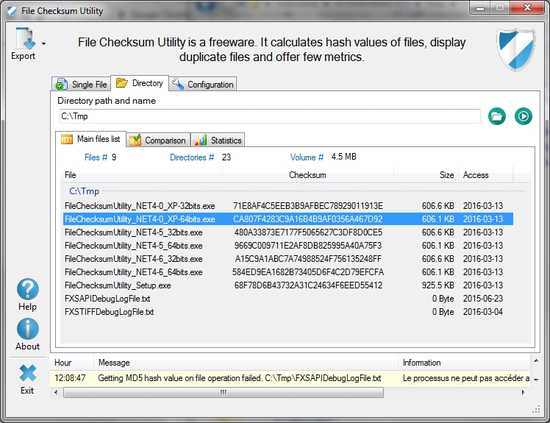

If you only know the MD5 sum of an original file, you must calculate your copy’s MD5 sum to check if it’s a match. A file will have different MD5, SHA-1, and SHA256 checksums. Different checksum algorithms produce different results. SHA-256 serves a similar purpose to a prior algorithm recommended by Ubuntu, MD5, but is less vulnerable to attack. SHA-256 is a stronger, more secure algorithm. SHA-256 hashes used properly can confirm both file integrity and authenticity. Some Linux distros may also provide SHA-1 sums, although these are even less common. Of course, md5, crc or sha1 come to mind, and if I wanted a quick solution, I'd go for it. The program sha256sum is designed to verify data integrity using the SHA-256 (SHA-2 family with a digest length of 256 bits). We’ll primarily discuss SHA-256 sums here, although a similar process will work for MD5 sums. However, SHA-256 sums are now more frequently used by modern Linux distributions, as SHA-256 is more resistant to theoretical attacks. For example, there are several different types of checksums. Traditionally, MD5 sums have been the most popular. The process may differ a bit for different ISOs, but it usually follows that general pattern. Type cd followed by the path to the folder e.g.: cd Documents Next, type this and press Enter. Navigate to the folder that contains the file wherein the MD5 checksum you want to verify is.

#Sha checksum iso
This confirms the ISO file hasn’t been tampered with or corrupted. Use the Windows Command Prompt Press the Windows key + R to open the Run window, type cmd in the text field, and press Enter.
#Sha checksum download
You’ll download a checksum and its digital signature from the Linux distribution’s website.You’ll download the Linux ISO file from the Linux distribution’s website–or somewhere else–as usual.The process of checking an ISO is a bit complex, so before we get into the exact steps, let’s explain exactly what the process entails:


 0 kommentar(er)
0 kommentar(er)
